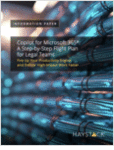In the past year, viral lies and conspiracies have saturated our public discourse, with concrete results. The scale and speed with which falsehoods have spread about everything from the outcome of the 2020 election to the Jan. 6 attack to COVID-19 vaccines, and much else, have led to real-world consequences for companies and people—ruined reputations, lost business value, security expenses, and death threats, to name a few. The prevalence of disinformation can impact all kinds of businesses by affecting corporate brands, sales, partnerships, employee and customer retention, physical security, and even stockholder activism.
Partly in response to the spread of false narratives, 2021 witnessed a new trend: the proliferation of counter-disinformation litigation. While many of these suits are still in the early stages, plaintiffs have seen notable (and surprising) successes thus far, suggesting the emergence of a specialized, potent tool to combat phony and harmful narratives. Both victims of false narratives and potential defendants should pay heed to these novel developments.
This content has been archived. It is available through our partners, LexisNexis® and Bloomberg Law.
To view this content, please continue to their sites.
Not a Lexis Subscriber?
Subscribe Now
Not a Bloomberg Law Subscriber?
Subscribe Now
LexisNexis® and Bloomberg Law are third party online distributors of the broad collection of current and archived versions of ALM's legal news publications. LexisNexis® and Bloomberg Law customers are able to access and use ALM's content, including content from the National Law Journal, The American Lawyer, Legaltech News, The New York Law Journal, and Corporate Counsel, as well as other sources of legal information.
For questions call 1-877-256-2472 or contact us at [email protected]


 Cifotart/stock.adobe.com
Cifotart/stock.adobe.com







